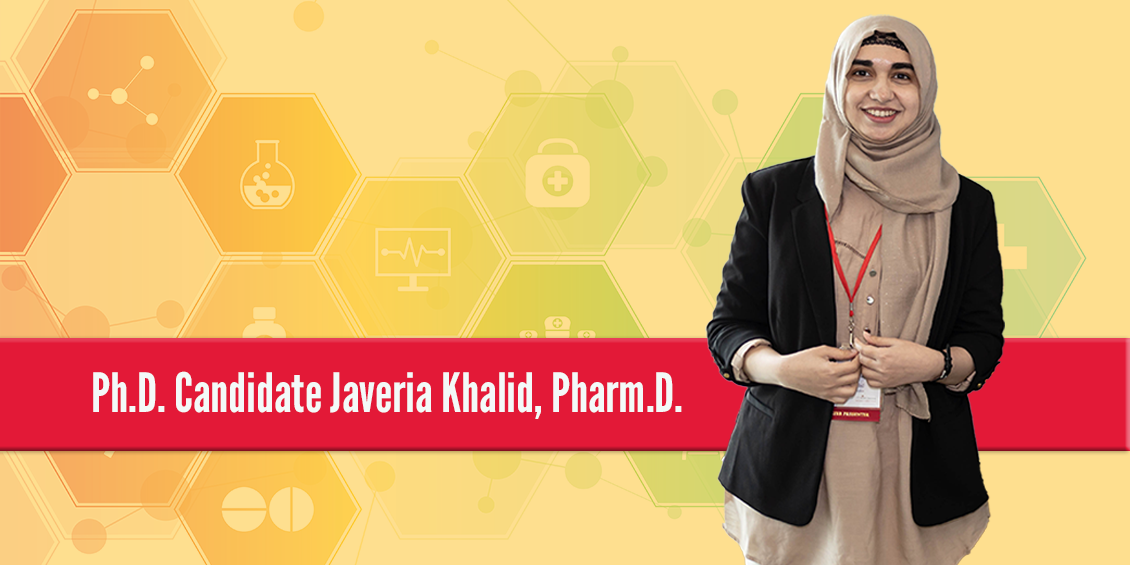Student Feature: Javeria Khalid

Loving the Liver
Fulbright Scholar Khalid Developing Predictive Model for Liver Disease in UHCOP Ph.D. Program
With a focus on liver diseases and a passion for research, University of Houston College of Pharmacy Ph.D. Candidate Javeria Khalid, Pharm.D., is helping to develop a predictive model for the management of acute and chronic hepatitis.
Liver diseases are often seen as some of the most complicated diseases due to limited data on appropriate drug regime for patients with compromised liver function and reliance on expert opinion, which may vary among published reports. Khalid has set her sights on bringing real-world evidence to clinical decision making for patients who have liver disease.
Early Immersion
Khalid has explored many aspects of liver disease and its complications. While working as a hospital pharmacist in Pakistan, Khalid was working on her master’s degree in clinical practice translational research. For her master’s thesis, Khalid studied liver cancer caused by hepatitis C infection and the outcomes associated with patients who used a direct-acting antiviral to combat their hepatitis. Based on her research, Khalid received a promotion to work as a clinical pharmacist in the hospital’s liver transplant unit.
“I worked post-operatively with the transplant patients making dosing adjustments according to their individual liver functioning, and patient safety monitoring was in my hands,” Khalid said. “Similarly, I implemented policies surrounding the control utilization of a ‘last resort’ antibiotic in the liver donors.”
Desiring to serve more patients through the research track, Khalid began looking at various universities and applying for scholarships to earn a Ph.D. She applied for and was awarded the prestigious Fulbright Scholarship, but not without first overcoming a major challenge: Her research into health outcomes was considered “clinical sciences” and was not an area accepted by the scholarship panel.
During her scholarship panel interview, Khalid made a compelling case for her outcomes research, iterating that health outcomes research is related to public health, one of the areas accepted for the Fulbright. In addition to her focused research area positioning her as a subject matter expert, Khalid was one of 25 students from her region selected for the scholarship.
A New View
Then, Khalid was Texas bound to study under Rajender R. Aparasu, Ph.D., FAPhA, UHCOP Mustafa & Sanober Lokhandwala Endowed Professor and chair of the Department of Pharmaceutical Health Outcomes and Policy. Khalid was immediately immersed in hepatitis B infection research as she assisted Aparasu with a pharmaceutical company grant. She also had the opportunity to intern with a leading pharmaceutical company which dramatically changed her views on the industry.
“Initially, I thought pharmaceutical companies were just out to try and make money,” Khalid said. “I saw how the company was truly serving patients in terms of producing drug molecules and real-world evidence about the therapeutics they were developing.”
In November 2023, Khalid presented her research as a poster at the annual conference for the American Association for Study of Liver Diseases. Her findings provided the trends of viral hepatitis and rate of hepatitis B immunization among high-risk populations such as intravenous drug users.
Also in 2023, Khalid received a travel grant to attend the annual conference of ISPOR-The Professional Society for Health Economics and Outcomes Research and present her research on the health care expenditure of patients with viral hepatitis in the U.S.
Khalid’s affinity for her research and patient care focus was initiated by a personal experience with liver disease.
“My uncle, to whom I was very close, got liver cancer, and we did not come to know this until the last stage,” Khalid said. “I talked to the doctors about treatment and learned that liver diseases are most commonly diagnosed at the end stage when treatment is not available.”
Khalid’s hepatitis C research for her master’s thesis and experience as a liver transplant clinical pharmacist later solidified her deep interest in diseases of the organ.
For her Ph.D. dissertation, Khalid is researching health outcomes of hepatitis patients with chronic infection as well as other liver disease complications.
“Current studies look at clean populations, meaning patients without additional infections and diseases,” Khalid said. “This lends to the lack of proper data on outcomes as well as disease management of infected individuals with co-morbid conditions.”
Following her upcoming graduation, Khalid sees herself best suited for academia or as a scientist for a research organization.